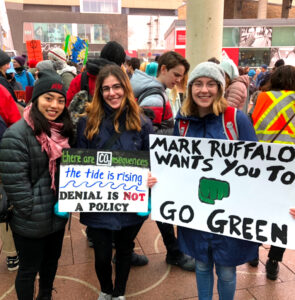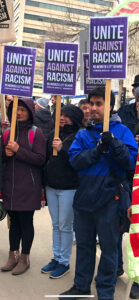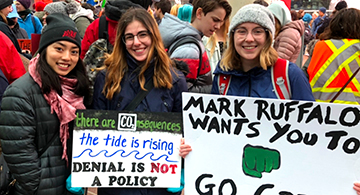
May 1st was International Workers Day or Labour Day for most countries around the world. Only Canada and the US commemorate Labour Day in September. The day was an official holiday for many of these countries. This means that marches, rallies and demonstrations were the headlines from around the world. On Friday, May 3rd there were also rallies and walkouts that occurred in the Province. Thousands of Gay-Straight Alliance or GSA supporters walked out of school that morning all over Alberta. High school students led these demonstrations. That afternoon in Edmonton, over 500 students organized a rally on climate change. They were loud. They had great banners and placards and they knew what they wanted: a better planet and future. I went and saw how inspiring it was to see young people making a stand for what they believe in.
Some privileged Filipino immigrants and Filipino-Canadians would say “rali na lang ng rali wala naman mangyayari dyan (you always rally, yet you achieve nothing)” or “Manggugulo lang kayo at mang-istorbo (You will create disturbance and a nuisance)”. And many older Filipinos here would even say “Iligal yan, bisita lang tayo dito sa Canada (That’s illegal, we’re only visitors in Canada)”. There’s no arguing with conservative Filipinos and they are also not open to new ideas and discussions. A friend told me, “Filipinos like them have big egos, they will argue for the sake of arguing”. I don’t generally agree with that. The history of Filipinos protesting goes way back. It started the 1898 revolution against Spanish colonization and it ousted two presidents.

So why do people rally and demonstrate?
In our isolated workplaces and communities, it is easy to feel hopeless. “We’re so small and the problem is so big,” we tell ourselves. And when we keep on repeating these, we start to believe it. It is easy to give up.
The initial rejections oftentimes happen to individuals or a small group of individuals. Also oftentimes the ideas of these individuals are necessary in any successful challenging conventional or conservative ideologies. Many think that the only way to escape public backlash is to back down from any challenge or stay quiet. However “being quiet” and not saying anything is exactly what status quo is about. It’s one of the reasons why people continue to be oppressed and exploited.
The difficulties in creating change are not unusual. And when critics say that the problem is too big, or that the public is too hostile, they are not saying anything that has not been said before. Yet in every previous social justice movement, activists were not fazed by these challenges but far from it, they overcame them, and changed the world for the better.
A very popular example of this was during the civil rights movement in the United States when four black students from Greensboro, North Carolina staged the first sit-in protest of against racial discrimination and segregation in the 1960s. They were met with ridicule and were scorned, even in their own black community. Within several years, as we saw in history, tens of thousands of activists were doing the same non-violent actions that pushed the forces of racial oppression to back off. In a slightly similar experience closer to home, Migrante Alberta started a campaign to have a consular office in the Province. Many older community members mocked the organization, saying that it’s not going to happen and that they already tried it in the past. After two years of campaigning and petition signing, a consulate was installed in Calgary in 2015.
Are we really making a difference?
There was a quote that says, “Every act of resistance inspired others to do the same. Every word of dissent made it easier for subsequent dissenters to raise their own voices”. I will add that this individual act will eventually become a collective voice. When we say that we are too small or too weak, then, we are trapped in an illusion that only “great men” have the power, and that ordinary people have no voice. The truth is that it is the ordinary people that create change. The EDSA People Power Revolution in the Philippines in February 1986 proved this when the Filipino people brought down a very powerful dictator. And while each of us is part of a much bigger picture, the first few, the small group talking about it may play an important role. We cannot build a movement if we do not believe and understand what we’re fighting for.
So yes, the problem is big, but that only makes every one of us even more important to the cause. And yes, each of us individually may feel small, against a hostile public, but we must not fall victim to hopelessness and cynicism. Greta Thunberg, a Swedish 15-year old teen that had just started ninth grade in 2018, decided to not attend school for a month. She demanded that the Swedish government reduce carbon emissions. She protested by sitting outside their Legislature every day during school hours with the sign “School strike for the climate” in Swedish. She inspired school students across the globe to take part in student strikes. As of March 2019, an estimated 1.4 million students in 112 countries around the world joined her call to strike for climate justice. While she inspired millions of teen agers, Thunberg was also inspired by the students at Marjory Stoineman Douglas High School in Florida who organized the “March for Our Lives” rally led by students against gun violence in USA.
Rali lang ba ang solusyon (is rallying the only solution)
Former Filipino Congressman and youth leader Raymond Palatino said, “A rally is actually the culmination of a particular campaign. It is counterproductive to hold rallies every now and then without first investigating and studying the issue, launching an awareness and information drive, and recruiting new members”. “We have too many meetings and only few rallies. I wish the reverse were true” he added. He meant that we must hold many education sessions, lobbying, networking, community integration and outreach, community forum and organizing to build up towards a rally.
A rally is a political action and participating in a collective political action is a democratic right and it does not become irrelevant. It also does not bring about instant change. Fundamental change and political reforms require time, patience, and determination. A rally or demonstration is an aspect of struggle that provides political education to the people.
In Alberta, we are currently faced by a newly elected conservative government that promised cutbacks on the workers while creating security blanket for rich corporations; continue to violate the environment while shutting down alternative and sustainable source of energy; violate the rights of the children and teens by limiting education and their rights. With this, we must boldly challenge social norms and even laws when they are unjust. As Palatino accurately said, “When we protest, it does not mean that we have a negative and gloomy view of the world. More than anything else, it reflects our undying optimism that yes, another world, a better world is possible. Love ignites the struggle for a new future. So spread the love, the hope, and become an activist”.


